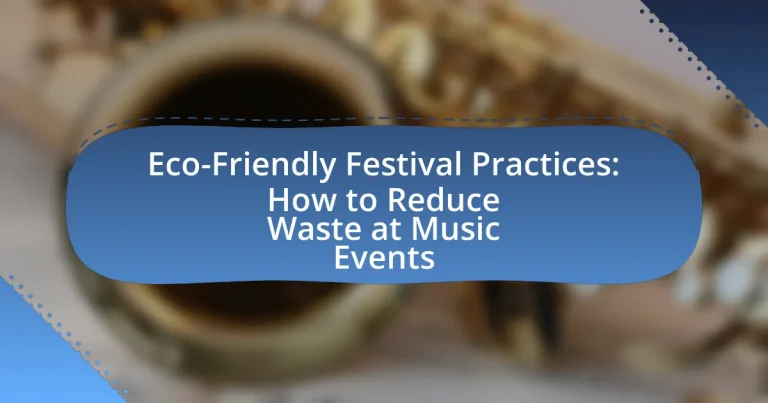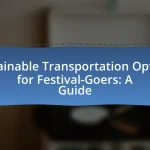Eco-friendly festival practices are essential strategies aimed at minimizing environmental impact during music events. These practices include the use of biodegradable materials, recycling and composting initiatives, and promoting sustainable transportation options. The article explores how these practices contribute to waste reduction, enhance the overall festival experience, and address significant environmental issues associated with festival waste. It also discusses the role of vendors, technology, and partnerships in promoting sustainability, as well as practical steps that festival organizers can take to implement these eco-friendly measures effectively.
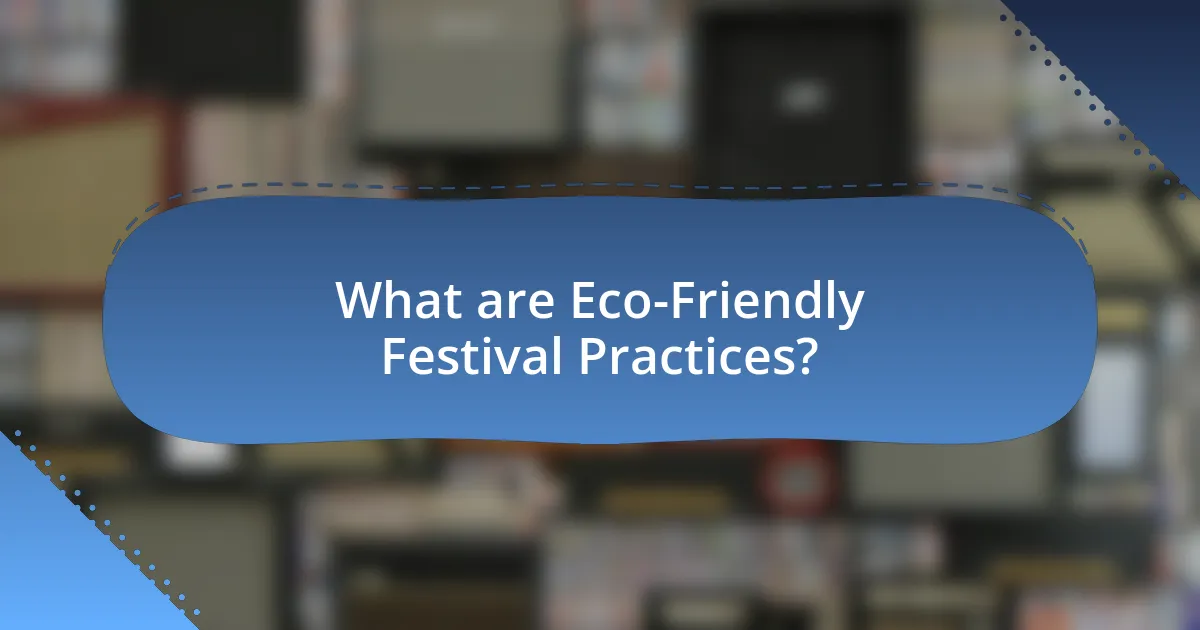
What are Eco-Friendly Festival Practices?
Eco-friendly festival practices are strategies implemented to minimize environmental impact during events. These practices include using biodegradable materials for food and drink containers, promoting recycling and composting stations, and encouraging the use of public transportation or carpooling among attendees. For instance, a study by the Green Music Initiative found that festivals adopting these practices can reduce waste by up to 50%, demonstrating their effectiveness in promoting sustainability.
How do these practices contribute to waste reduction at music events?
Eco-friendly practices at music events significantly contribute to waste reduction by implementing strategies such as recycling, composting, and the use of biodegradable materials. These practices minimize the amount of waste sent to landfills; for instance, events that incorporate recycling programs can divert up to 50% of waste from landfills, as reported by the Green Music Initiative. Additionally, composting organic waste reduces methane emissions from landfills and enriches soil, further promoting sustainability. The use of biodegradable materials, such as compostable cups and utensils, decreases plastic pollution and encourages responsible disposal. Collectively, these practices create a more sustainable event environment, demonstrating a commitment to reducing the ecological footprint of music festivals.
What specific strategies are involved in implementing eco-friendly practices?
Implementing eco-friendly practices at music events involves several specific strategies, including waste reduction, sustainable sourcing, and energy efficiency. Waste reduction can be achieved through initiatives such as providing recycling and composting stations, which have been shown to divert significant amounts of waste from landfills. Sustainable sourcing includes using local vendors for food and merchandise, which reduces transportation emissions and supports the local economy. Energy efficiency can be enhanced by utilizing renewable energy sources, such as solar power, which has been successfully implemented at various festivals, resulting in lower carbon footprints. These strategies collectively contribute to minimizing environmental impact and promoting sustainability in festival settings.
How do these strategies impact the overall festival experience?
Eco-friendly festival practices significantly enhance the overall festival experience by promoting sustainability and reducing environmental impact. These strategies, such as implementing waste reduction initiatives and encouraging the use of reusable materials, create a cleaner and more enjoyable environment for attendees. For instance, festivals that adopt comprehensive recycling and composting programs can reduce waste by up to 50%, leading to less litter and a more aesthetically pleasing venue. Additionally, engaging attendees in eco-friendly practices fosters a sense of community and shared responsibility, enhancing social interactions and overall satisfaction.
Why is it important to reduce waste at music festivals?
Reducing waste at music festivals is crucial for minimizing environmental impact and promoting sustainability. Festivals generate significant amounts of waste, with studies indicating that a single large festival can produce over 1,000 tons of waste, much of which ends up in landfills. By implementing waste reduction strategies, such as recycling and composting, festivals can decrease their carbon footprint and conserve resources. Additionally, reducing waste fosters a culture of environmental responsibility among attendees, encouraging them to adopt sustainable practices in their daily lives.
What environmental issues are associated with waste generated at festivals?
Waste generated at festivals leads to significant environmental issues, including pollution, habitat destruction, and resource depletion. The accumulation of plastic waste, food scraps, and other refuse can contaminate soil and waterways, harming local ecosystems. For instance, a study by the University of California found that music festivals can produce up to 1,000 tons of waste, with a substantial portion being non-biodegradable plastics. This waste not only contributes to landfill overflow but also poses risks to wildlife, which may ingest or become entangled in debris. Additionally, the energy and resources required for waste management further exacerbate the environmental impact, highlighting the urgent need for sustainable practices at such events.
How does waste reduction benefit festival organizers and attendees?
Waste reduction benefits festival organizers and attendees by lowering costs and enhancing the overall experience. For organizers, reducing waste minimizes disposal fees and can lead to savings on materials, as less waste requires fewer resources for management. Additionally, festivals that prioritize waste reduction often attract environmentally conscious attendees, increasing ticket sales and sponsorship opportunities. For attendees, a reduced waste environment enhances enjoyment by creating a cleaner, more pleasant atmosphere, which can lead to higher satisfaction and repeat attendance. Studies show that festivals implementing waste reduction strategies can see a 30% decrease in waste generation, demonstrating the tangible benefits of these practices.
What are the key components of a successful eco-friendly festival?
The key components of a successful eco-friendly festival include waste reduction, sustainable sourcing, renewable energy use, and community engagement. Waste reduction can be achieved through comprehensive recycling and composting programs, which have been shown to divert up to 90% of waste from landfills at events. Sustainable sourcing involves using local and organic food vendors, which not only supports the local economy but also reduces carbon emissions associated with transportation. The implementation of renewable energy sources, such as solar or wind power, can significantly lower the festival’s carbon footprint, with some festivals reporting up to 50% energy savings. Lastly, community engagement fosters a culture of sustainability among attendees, encouraging them to adopt eco-friendly practices in their daily lives.
What role do vendors play in promoting sustainability at music events?
Vendors play a crucial role in promoting sustainability at music events by providing eco-friendly products and services that minimize waste. They can implement practices such as using biodegradable packaging, offering plant-based food options, and sourcing materials locally to reduce carbon footprints. For instance, a study by the Green Music Initiative found that events utilizing sustainable vendors reduced waste by up to 30%. By prioritizing sustainability in their operations, vendors not only contribute to environmental conservation but also influence attendees’ behaviors towards more sustainable choices.
How can festival-goers contribute to waste reduction efforts?
Festival-goers can contribute to waste reduction efforts by actively participating in recycling and composting programs available at the event. By sorting their waste into designated bins, attendees help divert materials from landfills, which is crucial as studies show that recycling can reduce waste by up to 75%. Additionally, choosing to bring reusable items, such as water bottles and utensils, minimizes single-use plastics, which are a significant contributor to festival waste. According to the Environmental Protection Agency, reducing single-use plastics can significantly decrease overall waste generation. Engaging in these practices not only supports the festival’s sustainability goals but also fosters a culture of environmental responsibility among attendees.
How can festivals transition to more sustainable practices?
Festivals can transition to more sustainable practices by implementing waste reduction strategies, utilizing renewable energy sources, and promoting eco-friendly transportation options. For instance, festivals can adopt a zero-waste policy by providing recycling and composting stations, which has been shown to reduce landfill waste by up to 90% in some events. Additionally, using solar panels or wind turbines for energy can significantly lower carbon footprints; a study by the Green Music Initiative found that festivals using renewable energy sources reduced their greenhouse gas emissions by 50%. Furthermore, encouraging attendees to use public transport, carpool, or bike can decrease traffic congestion and emissions, as evidenced by the success of the Glastonbury Festival, which reported a 20% increase in public transport usage after implementing incentives.
What challenges do festivals face in implementing eco-friendly practices?
Festivals face significant challenges in implementing eco-friendly practices, primarily due to logistical constraints, financial limitations, and stakeholder engagement. Logistically, festivals often struggle with waste management systems that can effectively handle recycling and composting, leading to increased landfill waste. Financially, the initial investment required for sustainable infrastructure, such as solar power or biodegradable materials, can deter organizers, especially when budgets are tight. Additionally, engaging vendors and attendees in eco-friendly initiatives can be difficult, as not all stakeholders may prioritize sustainability, resulting in inconsistent practices across the event. These challenges highlight the complexities involved in transitioning to greener operations within the festival industry.
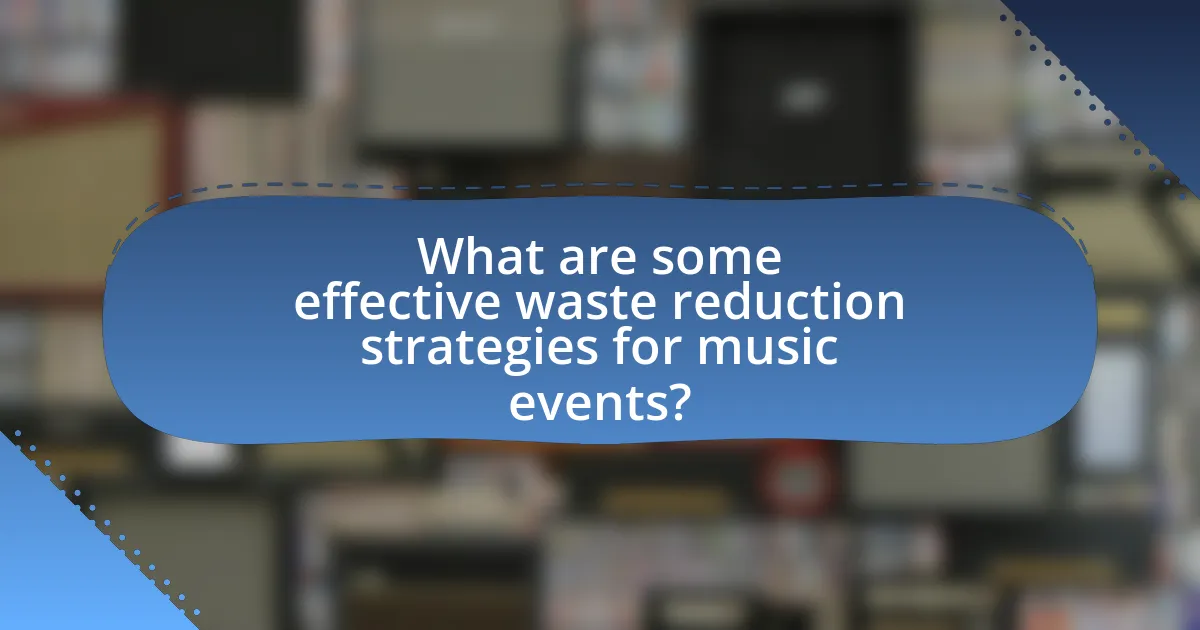
What are some effective waste reduction strategies for music events?
Effective waste reduction strategies for music events include implementing a comprehensive recycling program, utilizing digital ticketing and promotional materials, and encouraging the use of reusable containers. A recycling program can significantly decrease landfill waste; for instance, festivals that adopted such programs reported recycling rates of up to 70%. Digital ticketing reduces paper waste and streamlines entry processes, while promoting reusable containers, such as water bottles, can cut down on single-use plastics. Events that incentivize attendees to bring their own containers often see a marked decrease in waste generation, with some festivals reporting a reduction of over 30% in plastic waste.
How can recycling and composting be integrated into festival operations?
Recycling and composting can be integrated into festival operations by implementing designated waste stations throughout the venue that clearly separate recyclables, compostables, and landfill waste. These stations should be strategically placed in high-traffic areas to encourage proper disposal and minimize contamination. Additionally, festivals can provide education and signage to inform attendees about what materials can be recycled or composted, enhancing participation rates. For instance, a study by the Green Music Initiative found that festivals that actively promoted recycling and composting saw a 30% increase in waste diversion rates. By collaborating with local waste management services, festivals can ensure that collected materials are processed correctly, further supporting sustainability goals.
What materials are most commonly recycled at music festivals?
The materials most commonly recycled at music festivals include plastic bottles, aluminum cans, and cardboard. These materials are prevalent due to the high consumption of beverages and food packaging at such events. For instance, a study by the Green Music Initiative found that festivals can generate up to 1,000 tons of waste, with approximately 60% being recyclable materials like plastics and metals. This highlights the importance of recycling initiatives at festivals to minimize environmental impact.
How can composting reduce the environmental impact of food waste?
Composting can significantly reduce the environmental impact of food waste by transforming organic materials into nutrient-rich soil amendments, thereby diverting waste from landfills. When food waste decomposes in landfills, it generates methane, a potent greenhouse gas that contributes to climate change. In contrast, composting minimizes methane emissions by allowing aerobic decomposition, which occurs in the presence of oxygen. According to the U.S. Environmental Protection Agency, composting can reduce landfill waste by up to 30%, effectively lowering the overall carbon footprint associated with food waste disposal. Additionally, compost enriches soil, promotes healthy plant growth, and reduces the need for chemical fertilizers, further benefiting the environment.
What role does technology play in reducing waste at festivals?
Technology plays a crucial role in reducing waste at festivals by enabling efficient resource management and promoting sustainable practices. For instance, digital ticketing systems minimize paper waste by eliminating physical tickets, while mobile apps help attendees locate recycling and composting stations, thereby increasing participation in waste diversion efforts. Additionally, data analytics can optimize waste collection routes and schedules, reducing the carbon footprint associated with waste transport. According to a study by the Green Music Initiative, festivals that implemented technology-driven waste management solutions reported a 30% reduction in overall waste generation.
How can apps and digital platforms enhance sustainability efforts?
Apps and digital platforms can enhance sustainability efforts by facilitating waste reduction and promoting eco-friendly practices at music events. For instance, mobile applications can provide real-time information on recycling stations, encourage attendees to use digital tickets instead of paper, and offer incentives for using sustainable transportation options. Research indicates that events utilizing digital platforms for waste management can reduce waste by up to 30%, as seen in the case of the 2019 Glastonbury Festival, which implemented a dedicated app for waste tracking and recycling education. This integration of technology not only streamlines waste management processes but also engages festival-goers in sustainability initiatives, fostering a culture of environmental responsibility.
What are some examples of technology-driven waste reduction initiatives?
Technology-driven waste reduction initiatives include the use of mobile apps for waste tracking and management, smart bins that monitor waste levels, and digital ticketing systems that reduce paper waste. For instance, mobile applications like “WasteConnect” allow festival-goers to locate recycling and composting stations, enhancing proper waste disposal. Smart bins equipped with sensors can notify waste management teams when they are full, optimizing collection routes and reducing unnecessary pickups. Additionally, digital ticketing reduces the need for physical tickets, minimizing paper waste significantly. These initiatives demonstrate how technology can effectively streamline waste management processes and promote sustainability at events.
How can partnerships enhance eco-friendly practices at music events?
Partnerships can enhance eco-friendly practices at music events by leveraging resources, expertise, and networks to implement sustainable initiatives. Collaborations between event organizers, local governments, and environmental organizations can lead to the development of comprehensive waste management systems, such as recycling and composting programs, which have been shown to significantly reduce landfill waste. For instance, the 2019 Coachella Valley Music and Arts Festival partnered with the non-profit organization, “Sustainable Coachella,” resulting in a 30% reduction in waste through improved recycling efforts and educational campaigns. Such partnerships not only facilitate the sharing of best practices but also foster community engagement and awareness around sustainability, ultimately leading to more environmentally responsible events.
What types of organizations can festivals collaborate with for sustainability?
Festivals can collaborate with environmental organizations, local governments, waste management companies, and sustainability-focused nonprofits for sustainability. Environmental organizations, such as the Sierra Club, provide expertise in conservation practices and can help festivals implement eco-friendly initiatives. Local governments often have resources and programs aimed at reducing waste and promoting recycling, which can be beneficial for festival operations. Waste management companies offer services for efficient waste disposal and recycling, ensuring that festivals minimize their environmental impact. Sustainability-focused nonprofits, like the Green Music Initiative, can assist in developing strategies for reducing carbon footprints and promoting sustainable practices within the festival framework.
How do sponsorships influence eco-friendly initiatives?
Sponsorships significantly influence eco-friendly initiatives by providing financial support and resources that enable the implementation of sustainable practices. For instance, companies that sponsor music festivals often promote recycling programs, renewable energy sources, and waste reduction strategies, which can lead to a measurable decrease in the environmental impact of these events. A study by the Green Music Initiative found that festivals with corporate sponsorship focused on sustainability reported a 30% reduction in waste generation compared to those without such support. This demonstrates that sponsorships can effectively drive eco-friendly initiatives by aligning corporate social responsibility goals with event sustainability efforts.
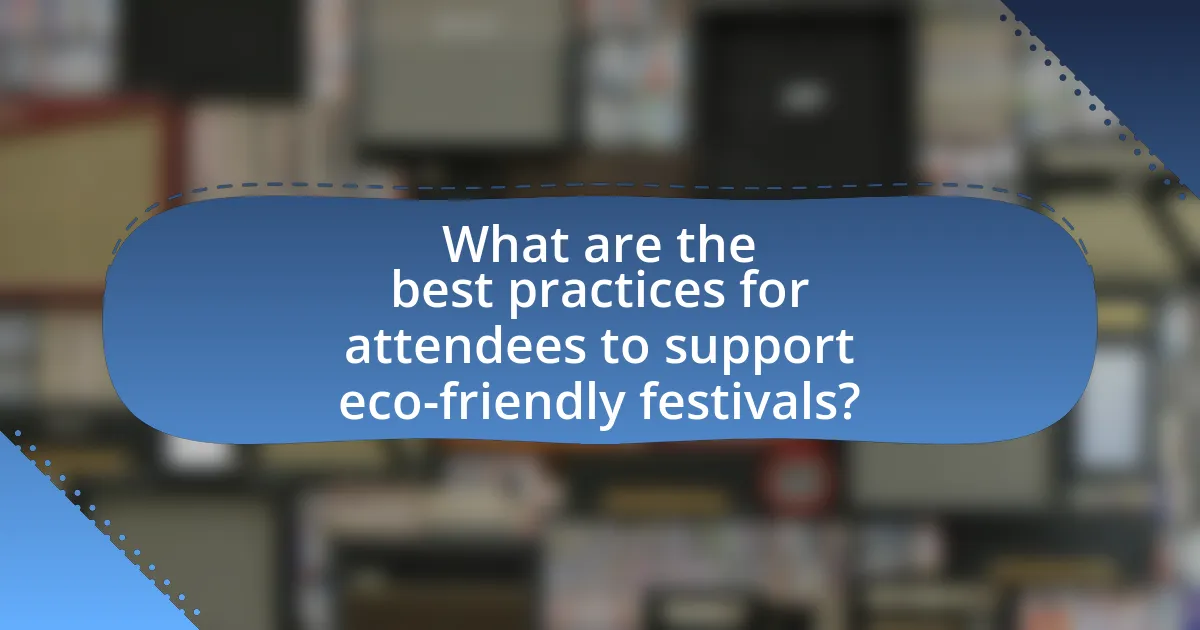
What are the best practices for attendees to support eco-friendly festivals?
Attendees can support eco-friendly festivals by adopting practices such as using reusable containers, minimizing single-use plastics, and utilizing public transportation or carpooling. These actions significantly reduce waste and carbon footprints associated with festival attendance. For instance, a study by the Green Music Initiative found that festivals implementing waste reduction strategies can decrease waste by up to 70%. Additionally, attendees should participate in recycling and composting programs provided at the festival, which further enhances waste management efforts. Engaging in these practices not only supports the festival’s sustainability goals but also encourages a culture of environmental responsibility among fellow attendees.
How can festival-goers minimize their waste during events?
Festival-goers can minimize their waste during events by adopting practices such as bringing reusable containers, utensils, and water bottles. These actions significantly reduce single-use plastics, which contribute to environmental pollution. For instance, a study by the Environmental Protection Agency indicates that approximately 30% of waste generated at festivals is plastic, highlighting the impact of individual choices. Additionally, utilizing public transportation or carpooling can decrease carbon emissions and reduce the overall waste associated with travel. By implementing these strategies, festival-goers can actively contribute to a more sustainable event experience.
What items should attendees bring to reduce single-use plastics?
Attendees should bring reusable items such as water bottles, cloth bags, and utensils to reduce single-use plastics. Reusable water bottles eliminate the need for plastic bottles, while cloth bags can replace plastic shopping bags. Additionally, bringing reusable utensils and plates helps avoid single-use cutlery and dishware, significantly decreasing plastic waste at events. According to the Environmental Protection Agency, reducing single-use plastics can lead to a substantial decrease in landfill waste and ocean pollution, highlighting the importance of these practices at festivals.
How can attendees participate in recycling and composting efforts?
Attendees can participate in recycling and composting efforts by utilizing designated recycling and compost bins available at the event. These bins are specifically marked to help attendees identify what materials can be recycled or composted, such as paper, cardboard, and food scraps. According to the Environmental Protection Agency, proper waste separation can significantly reduce landfill contributions, with recycling alone diverting over 35% of waste from landfills in community events. By actively using these bins, attendees contribute to a more sustainable festival experience and help minimize environmental impact.
What are some tips for choosing eco-friendly festivals to attend?
To choose eco-friendly festivals to attend, prioritize events that have clear sustainability policies and practices. Look for festivals that implement waste reduction strategies, such as recycling and composting programs, and those that use renewable energy sources. Research the festival’s partnerships with local environmental organizations, as collaborations often indicate a commitment to sustainability. Additionally, check if the festival promotes eco-friendly transportation options, like public transit or carpooling, to minimize carbon footprints. Festivals that provide information on their environmental impact, such as carbon offset initiatives, further demonstrate their dedication to eco-friendliness.
How can attendees identify festivals that prioritize sustainability?
Attendees can identify festivals that prioritize sustainability by researching the event’s environmental policies and practices. Many eco-friendly festivals publicly share their sustainability initiatives, such as waste reduction strategies, carbon offset programs, and partnerships with local environmental organizations. For instance, festivals like Glastonbury and Coachella have implemented measures to reduce plastic waste and promote recycling, which can be found on their official websites or promotional materials. Additionally, attendees can look for certifications from recognized sustainability organizations, which indicate a commitment to eco-friendly practices.
What questions should attendees ask organizers about their eco-friendly practices?
Attendees should ask organizers about their eco-friendly practices by inquiring specifically about waste management strategies. Questions may include: “What measures are in place to reduce single-use plastics at the event?” and “How is waste sorted and recycled during the festival?” Additionally, attendees can ask, “Are there partnerships with local organizations for composting food waste?” and “What sustainable transportation options are provided for attendees?” These questions are crucial as they directly address the effectiveness of the event’s environmental initiatives, which can be evaluated based on the organizers’ responses and any documented sustainability reports or certifications they may possess.
What are the future trends in eco-friendly festival practices?
Future trends in eco-friendly festival practices include increased use of renewable energy sources, enhanced waste management systems, and the promotion of sustainable transportation options. Festivals are increasingly adopting solar and wind energy to power their events, reducing reliance on fossil fuels. Additionally, advanced waste management strategies, such as composting and recycling initiatives, are being implemented to minimize landfill contributions. Sustainable transportation, including bike-sharing programs and electric shuttle services, is also gaining traction to reduce carbon footprints. These trends are supported by a growing consumer demand for environmentally responsible practices, as evidenced by a 2022 survey indicating that 70% of festival-goers prefer events that prioritize sustainability.
How are festivals evolving to meet sustainability goals?
Festivals are evolving to meet sustainability goals by implementing comprehensive waste reduction strategies, utilizing renewable energy sources, and promoting eco-friendly practices among attendees. For instance, many festivals now incorporate waste sorting stations to facilitate recycling and composting, significantly reducing landfill contributions. Additionally, events like Glastonbury have committed to using 100% renewable energy, showcasing a shift towards sustainable power sources. Furthermore, initiatives such as encouraging attendees to bring reusable containers and offering incentives for sustainable transportation options, like carpooling or public transit, are becoming standard practices. These measures collectively contribute to a more sustainable festival experience, aligning with global environmental goals.
What innovations are on the horizon for waste reduction at music events?
Innovations on the horizon for waste reduction at music events include the implementation of advanced waste sorting technologies and the use of biodegradable materials for food and beverage containers. These technologies, such as AI-driven waste sorting systems, can significantly improve recycling rates by accurately identifying and separating recyclable materials from waste. Additionally, the adoption of compostable and plant-based materials for single-use items is gaining traction, as evidenced by festivals like Coachella, which have committed to reducing plastic waste by using such alternatives. These innovations are crucial for minimizing the environmental impact of large gatherings and promoting sustainable practices within the music industry.
What practical steps can festival organizers take to implement eco-friendly practices?
Festival organizers can implement eco-friendly practices by adopting waste reduction strategies, such as providing recycling and composting stations throughout the event. These stations encourage attendees to dispose of waste responsibly, which can significantly decrease landfill contributions. For instance, a study by the Green Music Initiative found that festivals that implemented comprehensive waste management systems reduced waste by up to 70%. Additionally, organizers can partner with local vendors who use sustainable materials and offer plant-based food options, further minimizing environmental impact. By utilizing renewable energy sources, such as solar panels, festival organizers can also reduce their carbon footprint, aligning with eco-friendly goals.
